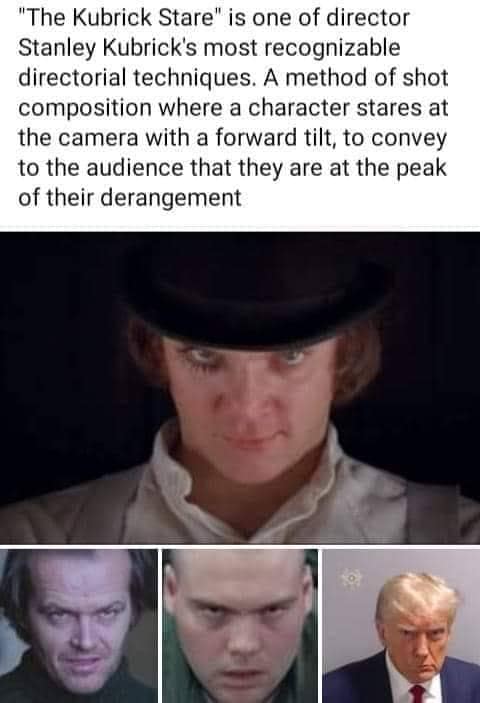

A Primer for Nadsat
Paper Topic(s) for A Clockwork Orange
Paper Topic 1
1) The 21st chapter of Burgess's 1962 book provides a very different type of ending than that of the 1971 Kubrick film (which did not include the 21st chapter). How does Burgess's message (theme) differ with the inclusion of the 21st chapter? How does the ending of the movie differ from the end of the complete book? In a thesis-driven essay compare any or all of the following: [1] the impact [2] the message [3] assessment of character [4] tone and [5] any other point of comparison.
2) Use MLA parenthetical citation for any outside sources you use to support your claims and observations.
3) In the conclusion you may argue for which ending you prefer and provide a rationale for why that might include the points of comparison above or any other point of comparison.
Paper Topic 2
1) What does Burgess seem to be saying about the nature of free will? Given the contemporary frame of neuroscience's understanding of brain chemistry and Robert Sapolsky's claims that human beings have no free will because of a completely determined [fated] behavior, how well do you think A Clockwork Orange relates to contemporary understanding and experience?
2) Use MLA parenthetical citation for any outside sources you use to support your claims and observations.
3) In the conclusion you may assess whether you think Burgess makes a compelling case for the existence of free will or whether free will is (as Sapolsky says) an illusion that the human user agrees to accept [i.e. the Cartesian Theater].
Paper Topic 3
1) What does Burgess seem to be saying about the appropriateness of punishment for aberrant behavior in A Clockwork Orange? Are the best laid plans for corrective behavior likely to go awry? Do the best laid plans for corrective behavior rob humans of an essential component that defines the human condition . . . the ability to choose.
2) Use MLA parenthetical citation for any outside sources you use to support your claims and observations.
3) In the conclusion you may assess whether contemporary forms of punishment or blame are warranted or if the absence of free will permits one to be more forgiving of other people's socially problematic behaviors (like crime, addiction, etc.)

I. Introduction A. statistic/quote/anecdote/other manner of introducing the subject or the book Thesis: State the message that Burgess is postulating in A Clockwork Orange and whether it still holds up today given the advances in neuroscience. II. Body Provide examples of scenes from the book that illustrate Burgess's notion of free will. In your commentary on these scenes explain whether his conclusion still holds up given the current state of brain research. III. Conclusion A. Does Burgess's notion of "free will" still hold up today [summary of position stated above in thesis and in commentary on individual scenes]? B. In the conclusion you may assess whether you think Burgess makes a compelling case for the existence of free will or whether free will is (as Sapolsky says) an illusion that the human user agrees to accept [i.e. the Cartesian Theater]. |
Stanford Encyclopedia of Philosophy on Free Will
Additional Materials:
Why the Free Will Debate Hinges on Intent? by Robert Sapolsky in Big Think Oct. 23, 2023
"The Fate of Free Will" by James Gleick in The New York Review of Books
"Why Free Will Doesn't Exist According to Robert Sapolsky" by Timothy Revell in The New Scientist
Determined: A Science of Life Without Free Will reviewed by John Martin Fischer [11-3-2023] at Notre Dame Philosophical Reviews
"What's Wrong with Determinism" Review of Determined by Robert Sapolsky" written by Tom Clark for Naturalism
Do We Have Free Will? Roberty Sapolsky and Andrew Huberman for Huberman Lab Clinics
"How A Flawed Experiment 'Proved' That Free Will Doesn't Exist" by Steve Taylor for Scientific American
Video
Do We Really Have Free Will with Robert Sapolsky The University of Chicago [Video]
Do We Have Free Will? Daniel Dennett vs. Robert Sapolsky at How To Academy Mindset [Video]
No Freewill, No Purpose, No God? Only Way to Change Your Life in 2024 with Tom Bilyeu [Video]
60 Minutes: Neurosurgeon Pioneers Alzheimer's, Addiction Treatments, Using Ultrasound
The Memory Pill: 60 Minutes [2015]